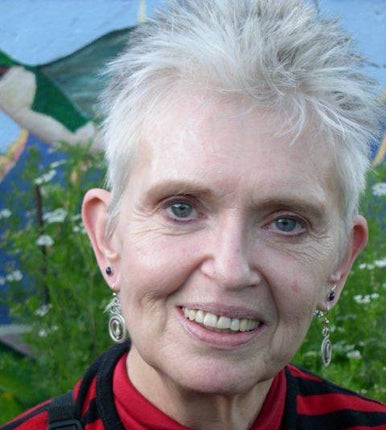Your support helps us to tell the story
From reproductive rights to climate change to Big Tech, The Independent is on the ground when the story is developing. Whether it's investigating the financials of Elon Musk's pro-Trump PAC or producing our latest documentary, 'The A Word', which shines a light on the American women fighting for reproductive rights, we know how important it is to parse out the facts from the messaging.
At such a critical moment in US history, we need reporters on the ground. Your donation allows us to keep sending journalists to speak to both sides of the story.
The Independent is trusted by Americans across the entire political spectrum. And unlike many other quality news outlets, we choose not to lock Americans out of our reporting and analysis with paywalls. We believe quality journalism should be available to everyone, paid for by those who can afford it.
Your support makes all the difference.Janine Pommy Vega outlived many of the people with whom she was linked by association – a Who's Who of Beat writers including Gregory Corso, Allen Ginsberg, Herbert Huncke and Peter Orlovsky.
In Ginsberg's "Dream Record, March 23, 1961" she is the "whitefaced blond in black jacket". More importantly, she outgrew her early inspirations, going on to find her own voice as a poet and to champion poetry as something that could turn lives around.
Her first book of poetry, Poems to Fernando, was published by Lawrence Ferlinghetti's famed City Lights Books in San Francisco in 1968. It became the 22nd volume in the Pocket Poets Series, and only the series' third volume by a female poet – the first two having been Marie Ponsot's True Minds (1956) and Denise Levertov's Here and Now (1957). Her most recent, The Green Piano: Poems, published by Black Sparrow Press, appeared in 2005. In between were The Bard Owl (1980), Drunk on a Glacier, Talking to Flies (1988), Mad Dogs of Trieste: New and Selected Poems (2000) and others.
Like untold numbers of people of a bohemian or merely weekend beatnik bent, her Beat baptism occurred through Jack Kerouac's eye-opening On the Road (1957). With it, she hit the bohemian mother-lode: "All the characters seemed to move with an intensity that was missing in my life."
Born in 1942 to Joseph and Irene Telkowski Pommy into a working-class New Jersey family, she grew up in Jersey City, six or so miles from New York. While still at high school she and her friend Barbara read a Time Magazine article which said where the Beats hung out. "It mentioned the Cedar Tavern in New York City," said Vega. "Barbara agreed to go with me and check it out. Outside the bar on University Place, we were nervous. We were both sixteen; would we get in? We tried to look as nonchalant as possible as we cut through the crowd of people and sat at the back."
They found themselves opposite "a dark-haired man, drinking wine at a table full of crumbs," who, no doubt saturnine as ever, introduced himself as Gregory Corso. With his usual easy familiarity, the poet name-dropped "Jack", "Allen" and "Peter" – names that the teenagers recognised. He invited the girls to meet his friends at an apartment on the Lower East Side. There she met Orlovsky, who read her his "First Poem" before he headed off to meet Ginsberg. Priorities first, he arranged a date the following Sunday.
When she and Barbara duly arrived, Corso whisked Barbara away. Eventually Ginsberg and Orlovsky emerged. After introductions, Ginsberg left, leaving Orlovsky and Pommy to become lovers. Shortly after, Orlovsky and Ginsberg set off for the West Coast. On their return, the bisexual Orlovsky enjoyed a parallel sexual relationship with her – "We juggled who slept with whom," she wrote. "With their single bed and double bed, somebody usually slept alone, and it wasn't Peter."
The course of her life was set. In December 1962 she met the Peruvian painter Fernando Vega, whom she duly married in Israel. For a while they lived in Paris where she "bottled" – collected money for street musicians – or worked as a model at the École des Beaux-Arts. She only returned to the US after her husband died after a heroin overdose in Ibiza, making her way to the West Coast.
Wanderlust drove her on. Between 1971 and 1975 she lived in Peru, Colombia and Bolivia, often teaching English, but also at one point living reclusively among the Aymara people on the Isla del Sol on Lake Titicaca where she completed Journal of a Hermit (1974) and Morning Passage (1976). Her patchy Tracking the Serpent: Journeys into Four Continents (1997) – in fact three – ostensibly premised on visiting matriarchal power sites in the Amazon, Europe and Nepal, emerged more as a memoir of sexual adventuring than adding to an understanding of female energy; the Shakti principles of Indian cosmology, so to speak. More lastingly, she was active in promoting poetry in New York State correctional facilities, through Bard College's Bard Prison Initiative. Her voice can be heard on Women of the Beat Generation (1996) and Across the Table (2007), the latter recorded in Woodstock, NY and at concerts in Italy and Bosnia.
She is survived by Andy Clausen, whom she had lived with since 1999, and her brother, Bill Pommy.
Janine Pommy Vega, poet and writer: born Jersey City, New Jersey 5 February 1942; married 1962 Fernando Vega (died 1965); died Willow, New York State 23 December 2010.

Join our commenting forum
Join thought-provoking conversations, follow other Independent readers and see their replies
Comments